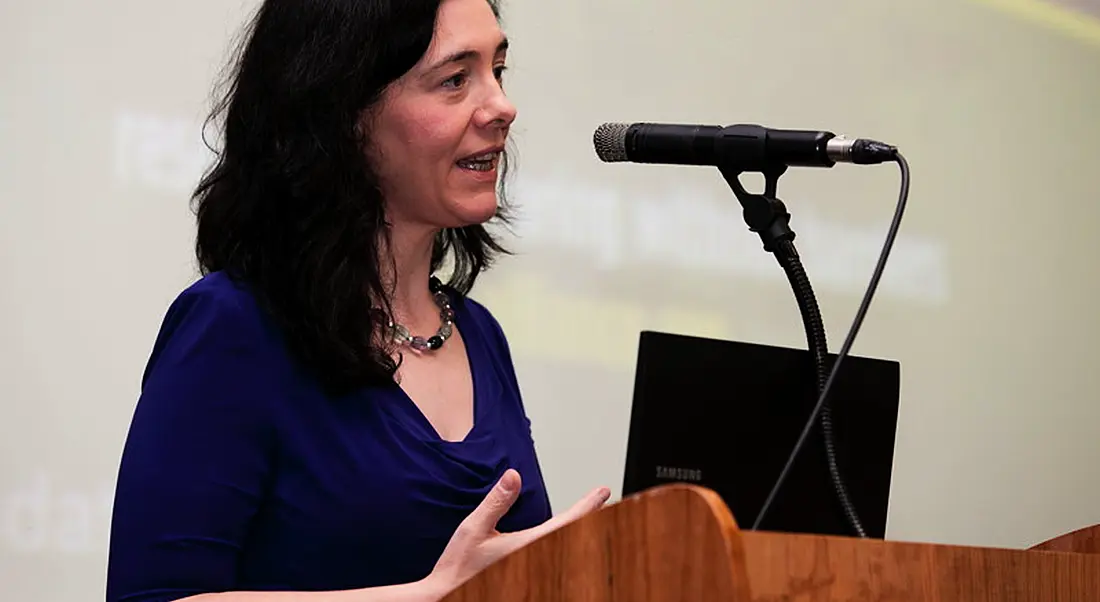In the fifth of our Science Week series, Royal Irish Academy member Dr Sandra Collins, director of the Digital Repository of Ireland, says it’s time the academic sector adopts a broader suite of metrics guiding career progression.
To coincide with Science Week in Ireland, members of the Royal Irish Academy discuss various issues within and outside of the classroom that Ireland would do well to reflect upon as it looks to position itself as learning and learned 21st-century society. Dr Sandra Collins is our fifth contributor.
I graduated in 1996 with a PhD in nonlinear fluid dynamics, and since then I have worked as a mathematician and university lecturer, an engineer and researcher in the telecommunications industry, a funding agency programme manager, and now as director of the Digital Repository of Ireland – an interdisciplinary research centre combining humanities and social sciences data with large-scale digital preservation infrastructure. I have always felt that my STEM (science, technology, engineering and mathematics) education gave me the training and tools to move across disciplines and sectors, and I believe strongly in the value of interdisciplinary research.
However, it is also true that academic career progression is often predicated on metrics, which are best achieved by building expertise within a single domain. Interdisciplinary research is difficult because of the investment required to understand multiple domains, and often not directly rewarded via standardised metrics. It was this reflection that led me to question the mobility of STEM graduates.
Return on educational investment
A 2012 paper published in Research in Higher Education finds positive career outcomes for individuals with an occupation closely related to their college degree, including a better income profile and greater job satisfaction, and increased chances to maximise their return on educational investment. Conversely, graduates working outside of their discipline may suffer both material and non-material disadvantages. There are reasons for remaining within your discipline – but how many STEM graduates do?
Comprehensive data from the United States’ Census 2012 published in July 2014 showed that 14.8m college graduates who were in employment reported having an undergraduate degree in STEM but only 26pc of those graduates had a STEM occupation.
The largest share of graduates going into a STEM field were students majoring in engineering, computer science and mathematics, with about 50pc of these employed in a STEM occupation. There are some gender differences, notably in engineering, where only 14pc of engineers were women, and in computer occupations, where 74pc of computer professionals are men. The occupations that STEM graduates move to are diverse and include management, healthcare and education.
It is clear that STEM degrees provide a range of career options, and the opportunities in the information and communications technology (ICT) domain in particular are evolving and expanding as the technologies change. Jobs we cannot imagine now will entice future STEM graduates away from more traditional occupations.
I can attest to the difficulties in recruiting and keeping STEM graduates in third-level research and education when industry is so buoyant. A 2012 graduate recruitment survey conducted in Ireland and Northern Ireland reported that the information technology and telecoms sector was the second most prolific creator of graduate jobs (13.6pc of all jobs created in 2011, an increase from 9.3pc in 2010).
Demand for expertise in STEM
STEM innovation has increased the global demand for STEM expertise significantly. Higher-education institutions, as incubators of innovation, aim to attract more STEM students. Enablers of global mobility include scholarships, the Marie Skłodowska-Curie actions, and international partnerships between education institutions. A high demand for STEM graduates in the global labour market results in strong employment prospects both domestically and overseas. Policies that inhibit international mobility (such as immigration and visa restrictions) can hamper recruitment and progression.
STEM mobility can also have negative drivers: a recent Fortune magazine article reports the average tenure across a sample of 716 women in the ICT industry was only seven years. In 68pc of cases, motherhood was cited as a factor in their decision to leave the tech industry but many women said it was a lack of flexible work arrangements, an unsupportive work environment or a salary that was inadequate to pay for childcare. Twenty-seven per cent of cases cited women’s discomfort in working environments that felt overtly or implicitly discriminatory as a primary factor in their decision to leave ICT.
In summary, STEM graduates are highly mobile, and are moving across disciplines, sectors and geographical territories, but how can we create an attractive environment in which employers can retain the best STEM graduates, and should we actively encourage mobility, and the diversity of experience and skills that it brings?
An important change for the academic sector would be to adopt a broader suite of metrics guiding career progression; metrics that recognise and reward the value of diverse experience. We should foster a culture of equal opportunity where mobility is a valuable experience for both STEM graduates and employers alike and recognised as such.
Dr Sandra Collins is the director of the Digital Repository of Ireland, the national trusted digital repository for humanities and social sciences data headquartered in the Royal Irish Academy. She is also a funded investigator at the Insight Centre for Data Analytics, the chair of the federation of All European Academies (ALLEA) E Humanities Working Group, and a member of two expert advisory groups for the European Commission. In 2014, she was one of Silicon Republic’s 100 top women in science, technology, engineering and maths.
The Royal Irish Academy is an all-island independent body that brings together the worlds of academia, government and industry, to address issues of mutual interest. Drawing on its members’ expertise, it contributes to public debate and public policy formation on issues in the humanities, science, technology and culture. Election to membership of the academy represents the highest academic honour in Ireland.
The views and opinions expressed by authors in this series are their own and do not reflect the position of the academy. They are simply an illustration of the various opinions reflective of the diverse academy membership.

This work is licensed under a Creative Commons Attribution 3.0 Unported License.




